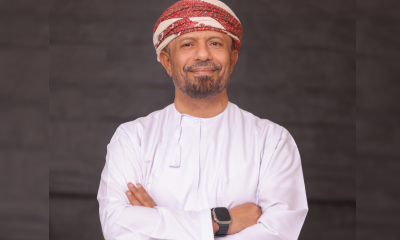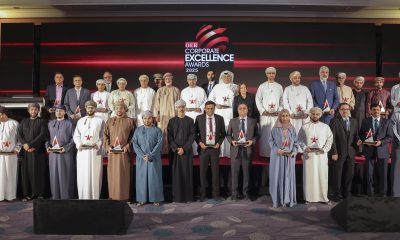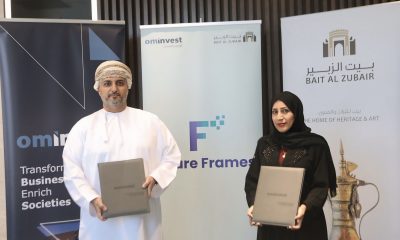Featured
Nabil Foods Undergoing Seismic Digital Transformation Shift: CEO

Nabil Foods CEO, Ahmed Sallakh talks to Business Live Middle East about the company’s journey in the regional and international markets, their digital transformation efforts, and more. Excerpts from the interview:
BL: What is the history & journey of Nabil Foods in the region and internationally?
Ahmed Sallakh: Nabil Foods started operations in Baghdad, Iraq in 1945 and moved to Amman Jordan in late 1988.
From the outset, the company has continued to focus on expanding operations from Amman. This has been achieved by introducing innovative and diverse products to its growing portfolio with the goal of meeting demand for the different tastes and preferences of its customers.
Read more: Oman Refco moving towards indigenous self-sufficiency
Today, Nabil Foods produces a wide range of frozen & chilled products that includes; beef, chicken, turkey, pastries, desserts & ready meals from international cuisines.
The company has over 800 highly experienced employees who work across production, operations and marketing to ensure all products are available in different styles of packaging in order to cater to the needs of the retail, wholesale and food service markets.
We are now a significant player in Jordan for the retail and food service sectors. By adopting current industry-leading technologies Nabil Foods has enabled global quick service restaurants (QSR’s) to partner with the company to supply them with products meeting their demanding specifications.
Nabil Foods has also opened its international office in Dubai JLT to manage international operations and continues to expand its presence and serve the MENA region.
BL: How is Nabil Foods embracing the technology disruption in the manufacturing sector?
Ahmed Sallakh: Nabil Foods is a pioneer in using the latest technology and equipment in the Middle East for the meat processing industry. Most manufacturing equipment is connected through highly advanced industrial control systems such as BMS and SCADA, through PLC’s and HMI which drive increased efficiency, decreased waste levels and delivery of higher quality products.
“Currently Nabil Foods is undergoing a seismic shift through digital transformation.” – Ahmed Sallakh, CEO
Currently Nabil Foods is undergoing a seismic shift through digital transformation. Whether you call it “Industry 4.0,” the “Industrial Internet of Things” or the “digital factory,” the company is managing four key disruptors: big data and connectivity; advanced analytics and artificial intelligence; human-machine interaction and digital-to-physical transfer.
These are paving the way for a future vision of a fully automated smart factory.
With changing lifestyles and rapidly evolving consumer behavior, how is the company adapting to stay ahead of the curve?
In a world with ever increasing and rapid change the company continues to focus on understanding customer needs and to understand and interpret their behavior. Nabil Foods works constantly through focus groups, panels and market analysis, aiming for continued feedback and understanding of customer needs.
Based on these results, the marketing, innovation and R&D teams work to develop products which meet the needs of their customers. One recent example is the introduction of counted calories ready meals which brings convenient, tasty and balanced meals for consumers through meeting their needs for healthy, fast and tasty food.
“Food manufacturers are moving into production of healthier products, free from artificial additives, preservatives, and GMO free…”
What are the top 3 trends in the food manufacturing segment in the GCC?
The number one trend in the food industry is to invest in innovation, aiming to differentiate products from competitors and to deliver products that meet the needs of customers and consumers across the region.
Food manufacturers are moving into production of healthier products, free from artificial additives, preservatives, and GMO free, for example, while continuing to maintain the same taste and flavor and importantly also adhering to food safety guidelines.
Environmentally friendly packaging and production lines are also a trend in the segment as the customers are more conscious of their footprint. Recyclable packages, energy and water saving machinery are some examples which the sector is implementing to meet these new demands.
And last but not least is convenience. With busy lifestyles, families seek quality and convenient food and services to be delivered to their homes.
Online platforms where they can buy preferred products which can be delivered and cooked in few minutes have become a significant industry trend.
“The future business strategy will also focus more on expanding the company’s platform across the MENA region both through its retail channel and its strong network of distributors.”
What is your vision for the company in 2019 and beyond?
As a market leader in Jordan, Nabil Foods strives to remain an important regional player with a vision of being the customer’s first choice in the culinary world and by delivering superior quality, and highly valued products.
With this in mind, we have already achieved the following:
- In late 2016, Nabil Foods expanded its international operations by opening a branch in Dubai JLT to serve its clients in the MENA region.
- In 2018, Nabil Foods went through a rebranding process by having a new theme and updated logo aiming to reinforce the Nabil Foods brand positioning in order to be more relevant to its regional customer base and to increase brand presence through its packaging.
- Nabil Foods is preparing to launch a children’s product range, notably Chicken Nuggets and Chicken Pops using an international license in a cooperation partnership with Universal Studios.
- Nabil Foods is also working to diversify its product portfolio by adding more recipes in key emerging markets which have changing tastes and preferences, and the company is also planning to expand its operations and to increase its customer base.
We will continue investing in our resources; tangible and intangible, for example, in information and digitalization to enhance efficiency and performance. The future business strategy will also focus more on expanding the company’s platform across the MENA region both through its retail channel and its strong network of distributors.
We will also continue to enhance and strengthen its channel relationships with key QSR’s (Quick Service Restaurants) in the region.
The company is also starting to look at developing new markets in Africa.
-

 Real Estate2 months ago
Real Estate2 months agoAl Mouj Muscat Unveils Azura Beach Residences Phase 2: A New Chapter in Waterfront Living
-

 Leaders Speak2 months ago
Leaders Speak2 months agoDhofar International Development and Investment Company: Driving Sustainable Growth and Strategic Synergies in Oman’s Investment Landscape
-

 Economy1 month ago
Economy1 month agoMaal Card: What Oman’s New National Payment Card Means for Everyday Users
-

 Events1 month ago
Events1 month agoOER Corporate Excellence Awards 2025 Honours Entities and Innovations in Oman
-

 OER Magazines2 months ago
OER Magazines2 months agoOER, October 25
-

 Arts and Culture2 months ago
Arts and Culture2 months agoOminvest and Bait Al Zubair Launch “Future Frames” to Empower Youth through Art and AI
-

 News2 months ago
News2 months agoMs. Noor Saldin, Founder of Modern Generation International School, Wins Woman of the Year 2025; School Honored for Empowering Future Female Leaders
-

 News1 month ago
News1 month agoSheikh Suhail Bahwan, Chairman of Suhail Bahwan Group, Passes Away































You must be logged in to post a comment Login